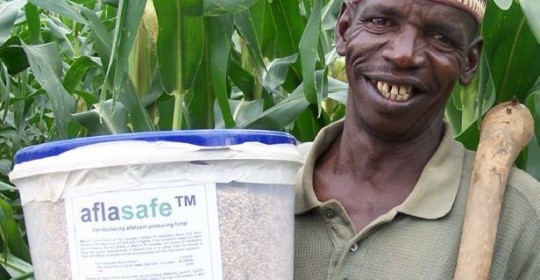
Azaiki Foundation & Public Library, IITA & The World Bank Partners For Smallholder Maize Farmers In Nigeria
AZAIKI FOUNDATION & PUBLIC LIBRARY, IITA & THE WORLD BANK PARTNERS FOR SMALLHOLDER MAIZE FARMERS IN NIGERIA TO ADOPT AFLASAFE TM, A TECHNOLOGY SHOWN TO REDUCE AFLATOXIN CONTAMINATION OF MAIZE UP TO 99 %
Donor:
Australia/USAID, Bill and Melinda Gates Foundation, Canada/Finance Canada, United Kingdom/DFID, United States/USAID through Deloitte Consulting LLC on behalf of the World Bank
Timeframe:
2013 – 2017
Background
Aflatoxin is a potent carcinogen produced by some species of Aspergillus fungi, most commonly found in maize and groundnuts. In Nigeria, an estimated 10% to 60% of maize has unacceptably high levels of aflatoxin. This contamination has harmful health effects for the consumers and negative economic consequences for the growers. Aflatoxin contamination is particularly threatening to the poorest and most vulnerable smallholders who consume much of the food they produce.
Developing nations are unable to realize their full potential to export crop products that do not meet aflatoxin standards set by importing nations unless they take appropriate steps to meet the standard. The AgResults pilot will provide incentives to smallholder farmers for adoption of a promising aflatoxin biological control technology, which reduces aflatoxin contamination of maize by 80% to 99%. This pilot will focus on demonstrating a new model for increasing smallholder adoption of the biocontrol product aflasafe™ in Nigeria, the largest producer and consumer of maize in Africa and the furthest along in registering the biocontrol product.
Project summary
Azaiki Foundation & Public Library, IITA & The World Bank Partners For Smallholder Maize Farmers In Nigeria
Few maize-producing organizations and farmers in Nigeria are aware of the aflatoxin problem or unwilling to invest in aflatoxin control measures without the confidence that there will be a market for aflatoxin-free crops since much of the market does not discriminate between low-aflatoxin and other maize. At the same time, regulators are highly constrained in their ability to enforce limits on aflatoxin contamination. An initial surplus supply of aflatoxin-free crops is needed to jumpstart the market.
The aflasafe™ pull mechanism incentivizes organizations with contract farming arrangements to work with smallholder maize farmers to adopt aflasafe™ while also increasing productivity. The pull mechanism builds a core group of participants to anchor the market for aflasafe™, expanding from 2,500 farmers in Nigeria in year 1 to 35,000 farmers in year 4. It features payments for performance that incentivize ‘implementers’ to help smallholder farmers to produce maize treated with aflasafe™. The pull mechanism also features technical assistance with the goal of increasing yields of participating farmers. Farmers who receive training are expected to share their knowledge of production technologies with other farmers.
Objectives:
- deliver development impact, namely in terms of health and economic benefits to smallholder farmers by reducing exposure of smallholder farm families and other consumers to aflatoxin.
- build a sustained market for aflasafe™ by establishing the necessary preconditions for long-term adoption of
aflasafe™. These preconditions include the emergence of reliable premium markets for aflasafe™ and low-aflatoxin maize, along with the emergence of affordable aflatoxin testing methods and enforcement of aflatoxin regulations. - learn about pull mechanisms, driven by the innovative financing community’s desire to understand how effective pull mechanisms are at incentivizing smallholder adoption of agriculture technologies.
Outputs:
- total production of aflasafe™-treated maize would exceed 260,000 tons by year four of the program, equivalent to around 3% of current maize production in Nigeria, of which 60,000 tons are estimated to be consumed on-farm and 200,000 would be sold in markets.
- deliver health benefits from reduced aflatoxin consumption among over 70,000 smallholder family members, not including downstream maize consumers. An average of 16,000 farmers are expected to be involved in the program per year with an average rural household size of 4.5 members.
Major partners
International Institute of Tropical Agriculture (IITA), National Agency for Food and Drugs Administration and Control (NAFDAC), Commercial Agriculture Development Project of the Federal Ministry of Agriculture and Water Resources, Poultry Association of Nigeria, Manufacturer Association of Nigeria, Nigeria Export Promotion Council.
Target country:
Nigeria
Crops:
Maize
Sources: Prof Steve Sinikiem Azaiki
Leave a reply →